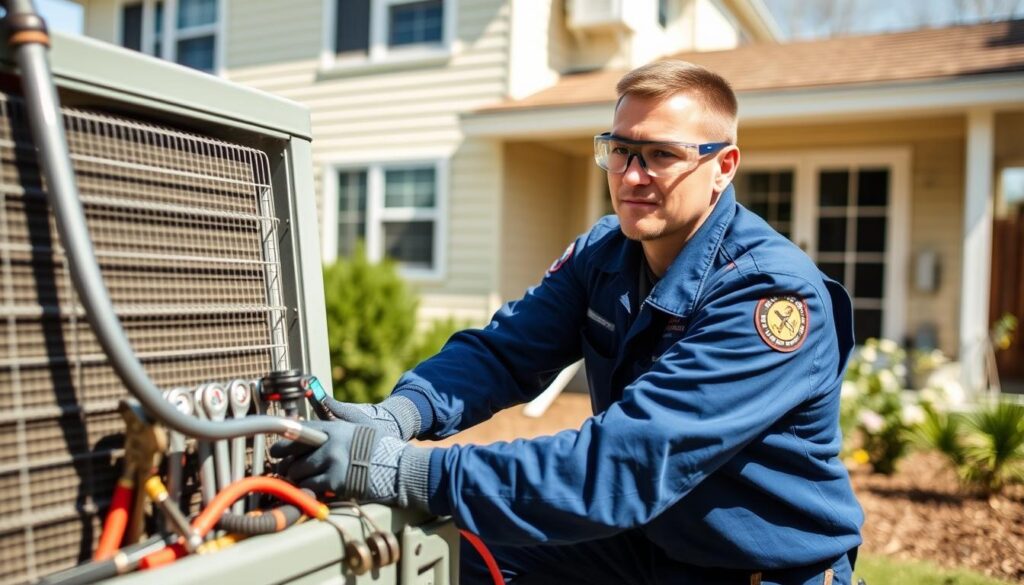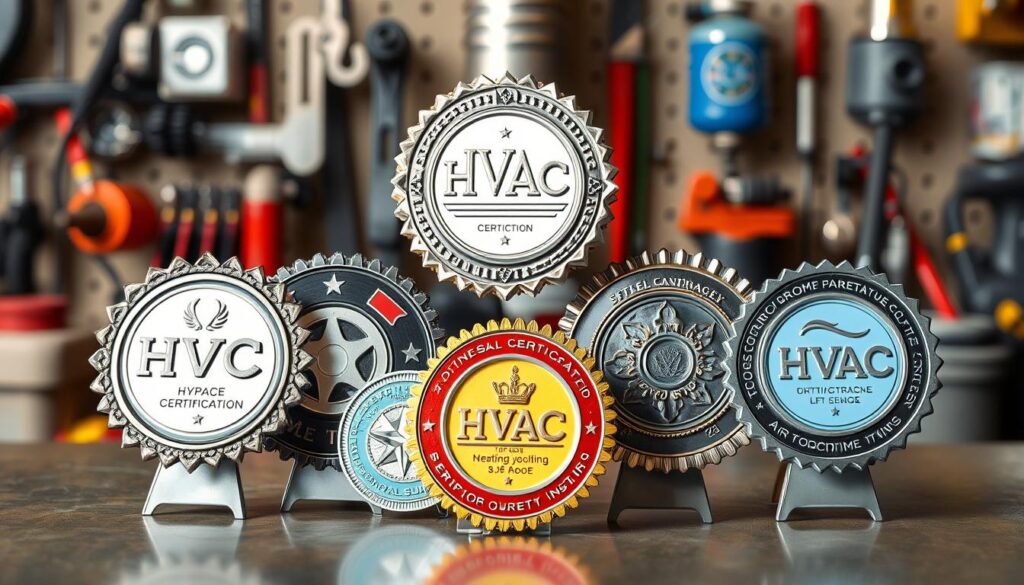Affiliate Disclosure
HVAC Guide Guys is a participant in the Amazon Services LLC Associates Program, an affiliate advertising program designed to provide a means for sites to earn advertising fees by advertising and linking to Amazon.
Do I Need a High School Diploma for HVAC? “Education is the most powerful weapon which you can use to change the world.” – Nelson Mandela
The HVAC field is both exciting and in-demand, with a 15% job growth rate by 2026, says the Bureau of Labor Statistics (BLS). As an HVAC technician, you’ll install, maintain, and repair systems that keep places comfortable. But, what education do you need to start this rewarding career?

Key Takeaways
- A high school diploma or GED is usually the minimum to start an HVAC career.
- HVAC training, apprenticeships, and on-the-job training offer the skills and certifications needed.
- Getting certifications like EPA Section 608 and NATE can boost your job chances and pay.
- Check your state’s licensing rules for HVAC technicians, as they vary.
- Going for an associate’s or bachelor’s degree in HVAC can lead to more career and business opportunities.
Table of Contents
Understanding HVAC Career Basics
HVAC (Heating, Ventilation, and Air Conditioning) technicians keep our indoor spaces comfy. They install, fix, and upkeep many HVAC systems. This includes everything from home furnaces to big commercial coolers.
Role and Responsibilities of HVAC Technicians
HVAC techs need a wide range of skills to do their job well. They check air quality, humidity, and temperature control. They work with parts like compressors and ducts to make HVAC systems work right.
Industry Growth and Job Outlook
The HVAC field is growing fast, thanks to the need for green climate control. The Bureau of Labor Statistics says HVAC jobs will grow 4% by 2029. This is quicker than most jobs.
Average Salary Expectations
In May 2019, HVAC mechanics made about $48,730 a year. Their hourly pay was between $14.94 and $30.58. In California, HVAC techs made even more, $48,898 as of January 2022.
“HVAC technicians are in high demand as the construction industry continues to grow and the focus on energy efficiency increases.”
Explore Our HVAC Shop
Looking for top-rated HVAC tools, parts, and accessories? Visit our shop and find the perfect solution for your needs.
Visit the ShopDo I Need a High School Diploma for HVAC
When you want to work in HVAC (Heating, Ventilation, and Air Conditioning), you might wonder about school needs. A high school diploma is common, but some places accept a GED (General Educational Development) diploma too.
A high school diploma is a good start for HVAC training. Many HVAC jobs need a diploma or its equal. Employers and some places also like to see a diploma. It shows you can read, write, and do math well, which is key in HVAC.
If you don’t have a high school diploma, don’t fret. There are HVAC diploma alternatives and HVAC education prerequisites to help you start. Here are some options:
- GED programs: Getting a GED can be a good choice for many HVAC programs.
- Vocational training: Some schools offer HVAC training without needing a diploma. They focus on practical skills.
- Apprenticeships: HVAC apprenticeships might not ask for a diploma. You learn by doing and get paid.
- Military training: Military training in HVAC can help you in civilian jobs too.
While a high school diploma is common, there are HVAC diploma alternatives and HVAC education prerequisites for HVAC careers. It’s important to look into local options. Find what fits your goals and situation best.
Educational Pathways in HVAC
Starting a career in HVAC (Heating, Ventilation, and Air Conditioning) opens many educational doors. Whether you’re new or want to improve your skills, there are many paths to consider. These include HVAC training requirements and apprenticeship opportunities.
Trade School Programs
Trade schools and community colleges have great HVAC programs. They give you the knowledge and hands-on experience needed. For example, Summit College in California’s HVAC program takes just 9 months.
These programs often help with costs, making them easier to get into. They prepare you to start working quickly.
Apprenticeship Opportunities
Apprenticeships are another good choice for HVAC training. They last 3-5 years and are run by groups like the Air Conditioning Contractors of America. Apprentices get real-world experience and classroom learning.
This mix of experience and education helps you become skilled in many areas.
On-the-Job Training Options
On-the-job training is also key for HVAC technicians. Most certifications need at least 12 months of experience. This ensures you can handle different systems and solve complex problems.
This practical experience, along with certifications, opens up more job chances and better pay.
Choosing a trade school, apprenticeship, or on-the-job training is important. The key to success in HVAC is always learning and improving. By exploring these options, you can start a fulfilling career with good pay and the chance to work with new technology.
Explore Our HVAC Shop
Looking for top-rated HVAC tools, parts, and accessories? Visit our shop and find the perfect solution for your needs.
Visit the ShopEssential HVAC Certifications and Licenses
Getting the right certifications and licenses is key in the HVAC field. These show you’re skilled, knowledgeable, and dedicated. They open up better job chances and can increase your earnings.
The EPA Section 608 Technician Certification is a must for HVAC techs. It’s given by the Environmental Protection Agency (EPA). It makes sure techs handle refrigerants safely and right.
Also, groups like North American Technical Excellence (NATE) offer certifications. The NATE exam checks your skills in HVAC work. This includes installation, maintenance, and fixing problems.
In some places, like Arizona, HVAC techs need special licenses to work. In Arizona, you need four years of experience and pass exams to get a contractor’s license. You also need Type I, II, or III licenses for different equipment.
| Certification | Eligibility | Exam Details | Benefits |
|---|---|---|---|
| EPA Section 608 Technician Certification | HVAC professionals working with refrigerants | Exam covers safe handling of refrigerants | Required for working with refrigerants; demonstrates commitment to environmental responsibility |
| NATE Certification | HVAC technicians with 6-12 months of experience | 100 multiple-choice questions, 60% passing score | Recognized industry credential; can lead to better job opportunities and higher pay |
| HVAC Excellence Certification | HVAC technicians with at least 2 years of experience | Covers various HVAC systems and competencies | Demonstrates advanced skills and knowledge; can enhance career advancement |
By getting the right HVAC certification programs and HVAC technician licensing, you stand out. You’re ready for success in the HVAC world.

EPA Section 608 Certification Requirements
As an HVAC professional, getting the EPA Section 608 Certification is key. This is because the Environmental Protection Agency (EPA) requires it. It makes sure technicians know how to handle refrigerants safely and right.
Certification Types
The EPA Section 608 Certification program has four types:
- Type I: Covers servicing small appliances
- Type II: Addresses high-pressure systems
- Type III: Focuses on low-pressure systems
- Universal: Encompasses all three types, allowing technicians to work on a wide range of HVAC systems
Examination Process and Costs
To get an EPA Section 608 Certification, technicians must pass a written exam. The exam cost varies, from $20 for Type I to over $150 for Universal in a proctored setting.
Technicians need a 70% or higher score to pass. Getting certified can take weeks to months, depending on how fast they study and schedule exams.
Certification Maintenance
An EPA Universal Certification doesn’t expire unless the EPA revokes it. To keep it, technicians must follow EPA rules on refrigerant handling and disposal.
The EPA Section 608 Certification is crucial for HVAC certification programs and HVAC job qualifications. It ensures HVAC technicians can work with refrigerants safely and responsibly.
Explore Our HVAC Shop
Looking for top-rated HVAC tools, parts, and accessories? Visit our shop and find the perfect solution for your needs.
Visit the ShopState-Specific HVAC Licensing Requirements
If you want to be an HVAC technician, knowing your state’s licensing rules is key. Some places like Illinois, Colorado, and New York don’t need a state license. But, most states have their own rules for HVAC workers.
The steps to get licensed vary by state. You might need to finish a special HVAC program, pass a test, or show you’ve worked in the field. For example, Texas wants you to pass the NATE exam and sign up with the state. Delaware has a different system with apprentice, journeyperson, and master licenses.
| State | HVAC Licensing Requirements |
|---|---|
| California | HVAC contractors must have at least 4 years of experience in the preceding 10 years to be eligible to take the C-20 HVAC license test. |
| Florida | HVAC contractors need specific licenses such as Class A State Certified Contractor, Class B State Certified Contractor, Class A State Registered Contractor, and Class B State Registered Contractor to work on units of different sizes based on BTU and tonnage. |
| Georgia | HVAC licensing regulations are overseen by the Division of Conditioned Air Contractors of the Construction Industry Licensing Board. |
Make sure to check the HVAC job qualifications and HVAC technician licensing rules in your state. This way, you’ll know you can legally work as an HVAC pro.
Alternative Education Paths for HVAC Careers
Getting into HVAC careers doesn’t always need a high school diploma. There are other ways to start, like getting a GED, using military training, or vocational programs. These options let you begin your HVAC journey without a traditional high school degree.
GED and Equivalent Programs
Many HVAC programs accept those with a GED. For instance, Atlanta Technical College offers free GED prep in Georgia. This helps students without diplomas get into career paths or earn a Technical Certificate in just six months.
Military Training Programs
Military service can give you hands-on experience and speed up HVAC certification. Veterans and active-duty personnel can use their military training for HVAC credentials. This makes it easier to move into HVAC careers after leaving the military.
Vocational Training Options
Vocational schools focus on HVAC training without needing a high school diploma. Programs like Atlanta Technical College’s HVAC Technician Assistant can be finished in months. Goodwin University in Connecticut also has certificate programs in manufacturing and robotics, leading to HVAC jobs.
If you want to start an HVAC career without a high school diploma, there are ways. GED programs, military training, or vocational schooling can help. These paths give you the skills and credentials needed to succeed in HVAC.
Explore Our HVAC Shop
Looking for top-rated HVAC tools, parts, and accessories? Visit our shop and find the perfect solution for your needs.
Visit the ShopCareer Advancement Opportunities in HVAC
The HVAC industry has many career paths for skilled workers. You can move up in your HVAC career by exploring different areas, taking on leadership roles, or starting your own business.
To grow in HVAC, keep learning and getting more certifications. This helps you stand out from new technicians. It also prepares you for more advanced or management roles.
HVAC workers can become project managers, system designers, or energy consultants. The need for better HVAC tech and energy saving opens doors for career growth.
| HVAC Career Levels | Typical Qualifications | Average Hourly Wage |
|---|---|---|
| Entry-level | Apprentices, employees without HVAC certifications, recent graduates | $22.47 |
| Mid-level | 3-6 years of experience, multiple HVAC certifications | $26.40 |
| Senior-level | Over 7 years of experience, numerous HVAC certifications, potential HVAC contracting roles | $32.83 |
Also, experienced HVAC technicians can start their own HVAC businesses. They use their skills and knowledge to succeed as entrepreneurs.
The HVAC career path is full of chances for growth and success. It’s a great choice for those looking for a fulfilling and lucrative HVAC job.

Conclusion
Getting a high school diploma is good for an HVAC career, but there are other ways to start. The HVAC field has lots of chances for growth and good pay. To do well, keep learning, get certified, and gain experience.
Think about your education choices for HVAC tech. You might go to trade school, join an apprenticeship, or learn on the job. Getting the right licenses and experience will help you succeed in HVAC.
The way to become an HVAC tech can change based on your state and goals. Look into different education paths, certifications, and licenses. This will help you find the right fit for your HVAC career.

